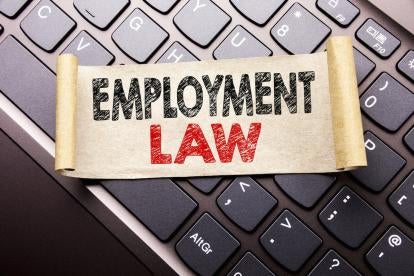State legislatures have been busy in 2021 passing new employment-related laws. Here we look at some of the highlights of new laws in Connecticut, Illinois, Ohio, New York, Pennsylvania, and Washington, D.C.
Connecticut is the latest state to prohibit discrimination based upon traits historically associated with race, including hair texture, protective hairstyles such as wigs or headwraps, and braids, cornrows, locs, twists, Bantu knots, afros and afro puffs. The law went into effect on March 10, 2021.
Illinois is poised to enact SB 1480, which was passed by the legislature in January 2021 and is awaiting signature. The law contains three provisions relevant to employers.
-
It amends the Illinois Human Rights Act so that it is unlawful to use a criminal conviction record to refuse to hire an applicant, or to take adverse action against a current employee, unless there is a “substantial relationship between the offense and the employment sought or held, or hiring or continuing to employ the individual with the conviction would involve an ‘unreasonable risk’ to property, other employees, or the public.” The law sets forth a number of specific factors to be considered in making that determination. It also requires the employer to notify the individual in writing of the decision, provide the individual five days to respond, and requires the employer to consider any response before making a final decision. This requirement will go into effect immediately upon enactment.
-
It amends the Business Corporations Act such that, beginning January 1, 2023, employers that have to file EEO-1 statements must include in the annual report that they file with the Illinois Secretary of State substantially similar information to that included in their EEO-1 report (i.e., race, gender, and ethnicity data of employees). Unlike EEO-1s, this data will then be published by the state and become publicly available information.
-
It amends the state Equal Pay Act to require employers with 100 or more employees in Illinois to obtain, within three years of the effective date of SB 1480, an equal pay registration certificate from the Illinois Department of Labor, which must thereafter be renewed every two years. To obtain the certificate, the employer must provide (a) an equal pay compliance statement containing the EEO-1 information, (b) provide a report containing a list of all Illinois employees, separated by gender, race, and ethnicity categories, along with the total wages to each employee paid in the past calendar year, (c) a statement signed by a corporate official attesting that (i) the employer is in compliance with Title VII and the Equal Pay Act, along with their Illinois state law equivalents, and that the average compensation for female and minority employees is not consistently below the average compensation paid to male and non-minority employees for similar work; (ii) job classifications are not restricted to one sex and that sex is not considered in retention and promotion decisions; (iii) any wage disparities are corrected when identified, and how often the employer evaluates its wages and benefits to ensure equal pay compliance; and (iv) discloses the system used to determine employee compensation, such as market pricing, state wage requirements, a performance pay system, or other measures. The amendments also include other significant administrative requirements. Failure to comply can lead to the loss of license to operate a business in Illinois.
In addition, the Illinois Department of Labor recently issued guidance for employers regarding employee time off to receive the COVID-19 vaccine.
New York City recently expanded its Fair Chance Act law; the amendments go into effect on July 29, 2021. Existing New York law contains a number of restrictions for employers wishing to obtain and/or use an applicant or employee’s criminal history. Employers are prohibited from asking about or taking adverse action based upon an applicant’s or employee’s past arrests or criminal accusations (or the circumstances relating to same), youthful offender adjudications or sealed records. Employers can, after a conditional offer of employment has been made, ask about criminal convictions. Employers may not take adverse action or otherwise discriminate based upon a criminal conviction unless there is a direct relationship between the criminal offense and the specific employment sought, or if employment would involve an unreasonable risk to property or to the safety or welfare of specific individuals or the general public; employers must consider specific statutory factors (under the state corrections law) when considering conviction history, must provide a copy of the criminal history information and the employer’s analysis to the individual, and must give them at least three days to respond. The employer must consider any additional information provided by the applicant, and if the employer decides to deny employment, it is required to inform the applicant, and upon request, to provide a statement setting forth the reasons for the denial.
The key amendments to the FCA:
-
Require employers to consider specific statutory factors (which are similar to but not the same as the factors that must be applied under state law) in evaluating an applicant’s or employee’s pending arrests/accusations.
-
Extend the FCA protections to current employees with respect to convictions arising during employment.
-
Prohibit employers from asking about or considering non-criminal violations (this does not include motor vehicle reports)
There are other changes; employers with employees in New York City who wish to use criminal history information should prepare to comply with these changes.
Further, Governor Cuomo signed Senate Bill S2588A on March 12, 2021, providing New York employees up to four hours of paid leave per vaccine injection to obtain a COVID-19 vaccine. The law provides that paid COVID-19 vaccination leave may not be charged against any other leave for which the employee is entitled. The law took effect immediately and expires on December 31, 2022.
Ohio has issued a revised new-hire reporting form (available here). Under Ohio law, employers must report all contractors and newly-hired employees to the state within 20 days of hire/engagement.
Philadelphia, Pennsylvania has expanded an existing law restricting employer use of credit history for employment purposes. Under the amendments, which went into effect in February 2021, financial institutions and law enforcement agencies operating in Philadelphia are now covered by the law’s requirements.
Washington, D.C. has passed a sweeping ban on non-compete agreements. Under D.C. Act 23-563, employers are prohibited from including non-compete provisions in any employment contracts and policies, with few exceptions. Additionally, the Act contains certain notice and anti-retaliation provisions. Importantly, it only applies prospectively; it does not affect existing non-compete agreements. The Act is projected to go into effect on March 19, 2021. Under the Act:
-
Employers cannot require or request that any D.C. employee sign an agreement containing a non-compete provision (e.g., a provision prohibiting an employee from being employed or providing services elsewhere or operating the employee’s own business).
-
Employers cannot have a policy prohibiting employees from engaging in outside employment/providing services to others for pay, or from operating their own business (e.g., employers cannot have policies or agreements prohibiting moonlighting).
-
Employers cannot retaliate against employees who refuse to agree to or do not comply with prohibited provisions and/or policies, or who raise questions or complaints about agreements/policies they believe violate the law.
-
Employers must provide specified notice language to current employees within 90 days of the law’s effective date, to new employees within 7 days of hire, and within 14 days upon request by an employee. (The required language is as follows: “No employer operating in the District of Columbia may request or require any employee working in the District of Columbia to agree to a non-compete policy or agreement, in accordance with the Ban on Non-Compete Agreements Amendment Act of 2020.”)
There are limited exceptions; the restrictions apply to all employees except volunteers for educational, charitable, religious or non-profit organizations, babysitters and certain officials of religious organizations, as well as “medical specialists” (licensed physicians who have completed a residency and earn at least $250,000/year). With respect to medical specialists, there are certain notice and timing requirements the employer must follow in order to enter into a valid non-compete agreement. Additionally, the law’s restrictions do not apply to non-competes entered into in connection with the sale of a business, confidentiality/non-disclosure provisions, or non-solicitation provisions.
Importantly, inclusion of a prohibited non-compete provision in an otherwise valid agreement will not invalidate the entire agreement; just the non-compete provision will be void and unenforceable. However, violations of the Act can result in civil liability and fines.
Employers with employees in D.C. should (1) review their handbooks/policies and ensure any policies prohibiting moonlighting during employment are revised so as to not apply to employees in D.C., (2) ensure new agreements with employees in D.C. comply with the Act (e.g., do not contain the prohibited non-compete provisions) and (3) prepare and provide the required notice to employees and ensure new employees receive the notice upon hire.





 i
i


